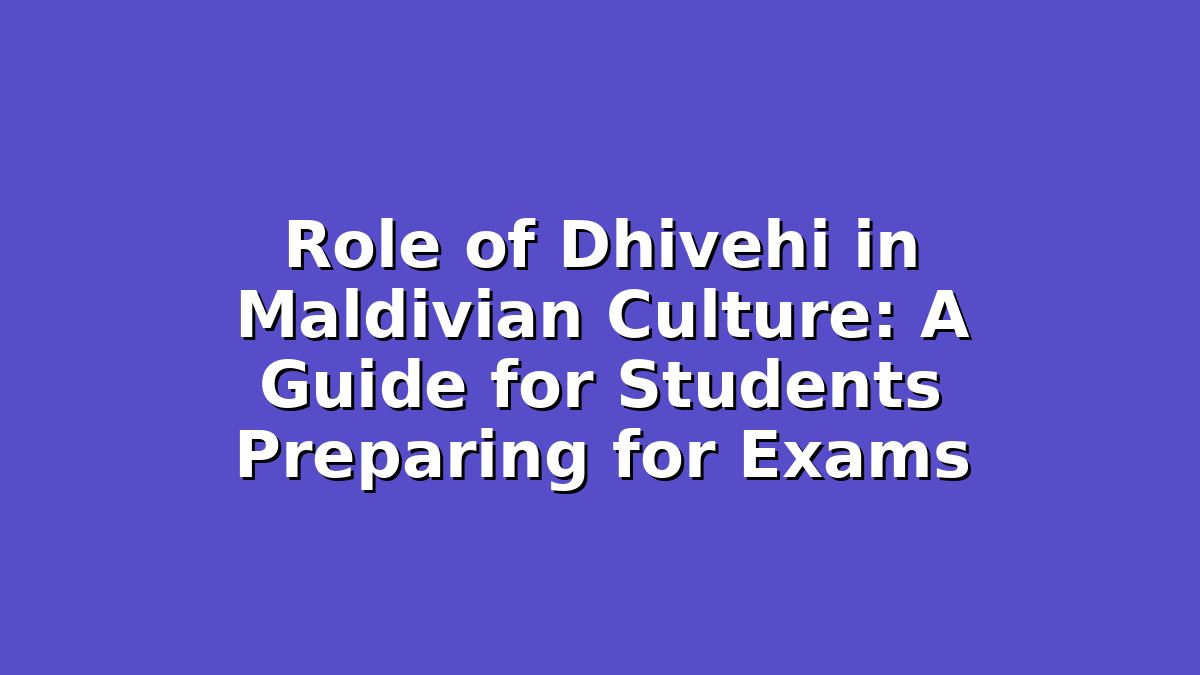Introduction
As students in the Maldives, understanding the significance of Dhivehi — our native language — is not only important for cultural identity but also essential for academic success. Dhivehi, the official language of the Maldives, is deeply woven into the fabric of Maldivian culture, history, and daily life. Whether you are preparing for your school exams or looking to improve your study habits, appreciating the role of Dhivehi can help you connect more deeply with your heritage while enhancing your language skills.
In this article, we will explore the role of Dhivehi in Maldivian culture through three key lenses: the language’s historical importance, its place in education and study, and practical tips on using Dhivehi effectively in your exam preparation. Each section will offer specific advice tailored to students aiming to excel in their studies while embracing their cultural roots.
1. Understanding Dhivehi’s Historical and Cultural Significance
Dhivehi is more than just a means of communication; it is a vessel carrying the stories, traditions, and values of the Maldivian people. The language has evolved over centuries, influenced by Arabic, Sanskrit, and other languages, reflecting the Maldives’ unique location as a crossroads of trade and culture in the Indian Ocean.
For students, recognizing this historical significance can deepen your appreciation for literature, poetry, and oral traditions rooted in Dhivehi. Many exam topics, especially in subjects like Dhivehi language and literature, history, and social studies, often refer to traditional texts and cultural narratives.
Study Tip: When preparing for exams, try to explore classical Dhivehi literature and historical texts alongside your syllabus. This approach not only enriches your knowledge but also helps you understand exam questions that may relate to cultural themes. You can create flashcards with key terms and historical events linked to Dhivehi to reinforce your memory.
2. Dhivehi in Education: Building Language Skills for Academic Success
Since Dhivehi is the medium of instruction in many Maldivian schools and an essential subject in exams, mastering it is crucial for academic achievement. Strong skills in reading, writing, and comprehension in Dhivehi will help you perform better across subjects, as language proficiency is foundational to understanding instructions and expressing your ideas clearly.
Many students struggle with Dhivehi grammar, vocabulary, and essay writing, which can affect exam performance. However, focusing on these areas can yield significant improvements.
Study Tip: Develop a consistent practice routine for Dhivehi language skills. Set aside daily time to read Dhivehi newspapers, books, or online articles to expand your vocabulary and improve comprehension. When practicing writing, try summarizing articles or composing short essays on cultural topics. Peer review can be helpful—exchange essays with classmates to get feedback on grammar and style.
Additionally, seek out past exam papers and practice writing answers under timed conditions. This not only familiarizes you with exam formats but also builds your confidence in using Dhivehi effectively under pressure.
3. Integrating Dhivehi into Effective Study Habits
Incorporating Dhivehi actively into your study habits can make learning more engaging and culturally relevant. Using your native language to organize your study materials and notes helps reinforce memory and understanding.
For example, when revising topics in science, mathematics, or social studies, try explaining concepts in Dhivehi, either verbally or in writing. Teaching yourself or a study partner in your mother tongue can clarify complex ideas and make study sessions more interactive.
Study Tip: Create mind maps, summaries, or mnemonic devices in Dhivehi to remember facts and concepts. Recording yourself reciting important points in Dhivehi and listening back can also aid retention. This method combines auditory and visual learning styles, which is particularly effective for many students.
Moreover, engaging with cultural content such as traditional songs, folktales, and proverbs in Dhivehi can provide enjoyable breaks during study sessions. These breaks refresh your mind while keeping you connected to your heritage.
Conclusion
Dhivehi plays a vital role not only as the language of communication but also as a cornerstone of Maldivian culture and education. For students preparing for exams, embracing Dhivehi can enhance your understanding of cultural contexts, improve language skills, and support effective study habits. By exploring the historical richness of Dhivehi, practicing language skills regularly, and integrating the language into your study routine, you set yourself up for academic success while honoring your cultural identity.
Remember, learning and using Dhivehi is a journey that strengthens both your mind and your connection to the Maldives. Approach your studies with confidence and curiosity, and let Dhivehi be your guide through both your exams and your cultural heritage.

Responses